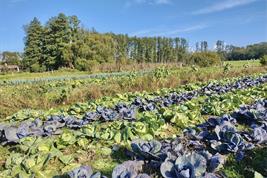15.04.2024

In a world where sustainable agricultural practices are of increasing importance, "agroecology" has become a pivotal term for discourse and action. A recent study in Environmental Science & Policy examines its diverse usage and provides insights for ongoing discussions on agroecology.
Titled "Complementing or Co-opting? Applying an Integrative Framework to Assess the Transformative Capacity of Approaches That Make Use of the Term Agroecology," presents a comprehensive evaluative framework for distinguishing between interpretations that enhance or undermine its systemic and transformative potential. Moreover, the framework allows to integrate diverse agroecological principles and practices and linking them to their overall impact on the agri-food system.
Applied to four farming approaches—sustainable intensification (SI), conservation agriculture (CA), organic farming (OF), and regenerative farming (RF)—the framework revealed concerns of hijacking or co-opting agroecology. Specifically, three strategies—simplification, false equivalence, and confusion— risk neutralizing the transformative potential of agroecology and possibly hindering its ability to reshape agricultural systems toward sustainability and equity.
According to the authors, a misuse of the term, whether intentional or not, poses significant implications for both scientific discourse and policy formulation. The authors emphasize the need to critically assess the usage of terms like agroecology and urge for concerted efforts from research, practice and policy to protect the integrity of the term and the principles it represents.
As global and interlinked challenges like food insecurity, environmental change, and social injustice persist, such research serves as a useful guide guides for shaping the future of agri-food systems.
About the journal:
Environmental Science and Policy is an esteemed interdisciplinary journal focusing on environmental issues, policy analysis, and management strategies. Covering topics such as climate change, food systems, biodiversity loss, human and ecological well-being, and sustainability more generally, the journal fosters scholarly exchange and collaboration among researchers, policymakers, and practitioners. With a notable impact factor of 6, it is renowned for its influential research contributions and its impact on environmental policy and practice.
Reference:
